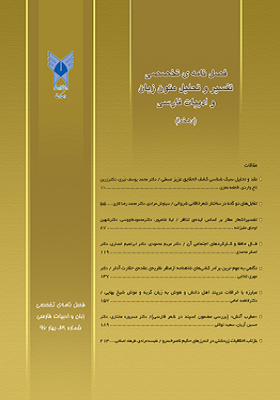بازتاب اخلاقیات زردشتی در اندرزهای حکیم ناصرخسرو
محورهای موضوعی : متون زبان و ادبیات فارسینفیسه مرادی 1 , فرهاد اصلانی 2
1 - دانشجوی دکترای زبان و ادبیات فارسی دانشگاه الزهراء (س)
2 - گروه تاریخ دانشکده ادبیات و علوم انسانی دانشگاه تهران
کلید واژه:
چکیده مقاله :
این مقاله سعی در تبیین این موضوع دارد که حکیم ناصرخسرو، در بیان دیدگاههای اخلاقی خود، که نمود آنها را بیش از همه در اندرزهای وی میتوان دید، از آموزههای اخلاقی زردشتی تأثیر پذیرفته است. تأثیرپذیری وی از ادبیات فارسی میانه و آیین زردشتی، محدود به اندرزهای اخلاقی نبوده است، بلکه رسوب این مضامین در کنه ضمیر وی، در ساختار زبانی و فکری آثارش نیز نمود یافته است. در این پژوهش، با توجه به ضرورت بررسی تأثیر زبان و ادبیات پهلوی بر آثار شاعران و نویسندگان قرون نخستین اسلامی و اهمیت این تأثیر در خوانش و تحلیل دقیقتر متون دورۀ اسلامی و با توجه به اینکه نفوذ زمینههای فکری و زبانی ادبیات فارسی میانه در آثار دورۀ اسلامی اغلب توسط پژوهشگران نادیده گرفته شده است؛ به بررسی تطبیقی اندرزهای حکیم ناصرخسرو و متون اخلاقی زردشتی با تکیه بر متن کتاب ششم دینکرد، که در واقع چکیدۀ اندرزنامههای زرتشتی است، پرداخته شده و با تحلیل شباهتهای این دو اثر در دستگاه فکری و فلسفی و در بیان دیدگاههای اخلاقی، به این نتیجه دست یافتهایم که حکیم ناصرخسرو، در سرایش اندرزها، تحت تأثیر و وامدار ادبیات و آیین زردشتی بوده است.
This article seeks to explain that Naser Khosro had been inspired by Zoroasterian ethical teachings in expressing his moral views – which are mostly represented in his counsels. The effect he received from Middle Persian Literature and Zoroastrianism is not just limited to ethical counsels; the penetration of such themes in his subconscious mind had influenced the linguistic and mental structures of his works. In this research, on account of the significance of investigating the effect of language and Pahlavi's literature on early Islamic centuries poets and writers' works, and the significance of such an effect on reading and a more precise analysis of Islamic texts era, as well as considering the fact that the penetration of linguistic and mental themes of Persian Middle Literature into works of Islamic era has often been neglected by researchers, a comparative study of Naser Khosro’s counsels and Zoroasterian ethical texts using Dēnkard (Acts of the Religion) full-text book IV – which is in fact the abstract of Zoroasterian counsels – has been conducted. With the analysis of the similarities between these two works in a mental and philosophical system, and from moral perspectives, we have concluded that Naser Khosro had been influenced by, and owes a lot to Zoroaterianism and Zoroasrian literature in writing his counsels.
16. مزداپور، کتایون. 1386. اندرزنامههای ایرانی. تهران: دفتر پژوهشهای فرهنگی.
_||_


